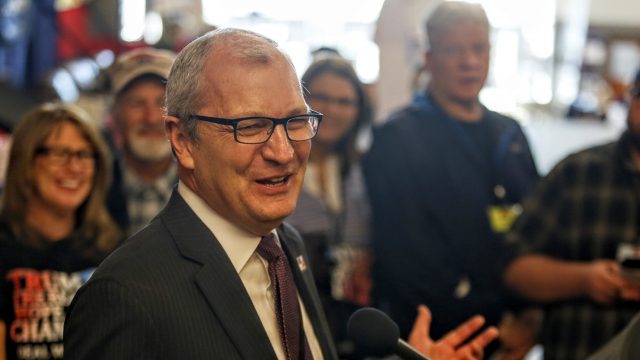Kevin Cramer's Endorsement Of Donald Trump Beginning To Look Like A Savvy Political Move

North Dakota Congressman Kevin Cramer upset a lot of people when he decided to make himself an early proponent of Donald Trump’s presidential campaign.
Cramer’s opponent this cycle, Democrat Chase Iron Eyes, has vowed to make the Trump endorsement a cornerstone of his campaign. Even a number of Republicans in the state were put off by the move, a reflection of the deep divides Trump has inspired among conservatives.
I’ve expressed by disappointment in Cramer’s endorsement as well.
But whatever your feelings about Trump, now that Cramer has been tapped as an adviser to the candidate on energy issues, it’s beginning to look as though the endorsement may have been savvy politics.
By his association with Trump, Cramer has been elevated to a greater level of prominence than an at-large member of the House running for this third term is used to, and he’s using that platform to advance some pretty good ideas on American energy policy.
For instance, in this Bloomberg article, Cramer calls for a state-first approach to regulation and an expiration of the renewable fuels standard and wind power production tax credit:
There’s also an extensive list of Environmental Protection Agency regulations that Cramer says should be tossed, beginning with the Clean Power Plan and followed by just-issued methane curbs.
“Let’s start with a states-first regulatory regime, roll back a lot of the federal regulations,” Cramer said. “Let states handle methane and fracking.”
Cramer, who offered an early endorsement of Trump, said he’s told the campaign that it should advocate letting two popular government programs, the Renewable Fuel Standard and production tax credit for wind power, expire.“I think the whole thing should be allowed to expire because the market has been created.” he said, referring to the RFS. “Free markets are free markets and they help keep the price down for consumers.” The same logic applies to the wind tax credit, which was extended through 2019 in last year’s spending deal. It shouldn’t be extended again, he said.
In this article with E&E News, Cramer calls for a flattening of the tax code surrounding all types of energy production:
However, also included is “a little bit on tax policy, trying to find a way to truly flatten out an all-of-the-above fair tax treatment of all forms of energy,” he said, drawing a contrast between the renewable production tax credit and breaks that allow oil and gas companies to write off depleting assets and expenses associated with exploration and drilling.
“There’s a difference between a tax credit, which is one industry getting money from another industry, and then there’s a tax deduction when you get to keep your own money to reinvest,” Cramer said. “What I just generally think is that someone smarter than me would have to come up with it, but a way to use a deduction or depreciation schedule that rewards all the winners, that doesn’t pick losers, but rewards all the winners. If it is an American-made energy, what part of the tax code could we find a nice flattener that truly creates a level playing field?”
Citing the intangible drilling costs that oil and gas producers can write off, “that’s the type of treatment that if we could find a way to apply that type of an incentive — to me, it’s not even an incentive, it’s just allowing companies to keep their own profits and reinvest them and defer their tax liability, to somehow find a way to use that model and apply it to all technologies,” he said, later adding, “a technology-neutral tax treatment is exactly what I’m talking about.”
When news of Cramer’s emergence as a Trump adviser first made headlines there was an attempt to pigeonhole him as a “climate change skeptic.” Or, to use a more bombastic term from BarackObama.com, a climate change “denier.” But I think many are finding that Cramer’s positions on energy production and environmental issues are far more nuanced than all that.
For instance, Cramer has said that he’d support a small fee on carbon tied to carbon emissions to pay for research into ways reduce emissions from fossil fuels. Some touted this as Cramer supporting a carbon tax, but he denied that this was accurate.
“I would never encourage him or push him or even recommend him to initiate any type of a carbon tax,” Cramer told The Hill. But he did say that Trump needs to address public demand for action on climate change. “[M]y advice would be, while I’m a skeptic, as well, he is a product of political populism, and political populism believes that there needs [to be] some addressing of climate change,” he said.
I don’t think I could ever bring myself to like the rise of Trump in American politics, or to condone the politics which inspired it. But if a silver lining is catapulting Cramer’s philosophy on energy development to the national stage I might be willing to grant a degree of grudging acceptance.




